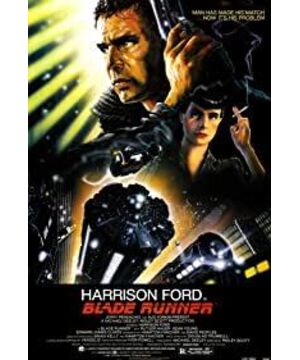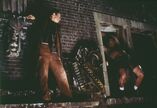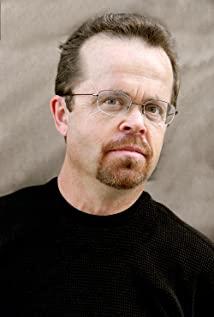Abstract: In the trend of post-industrialization and commercialization, people increasingly lose the meaning of life and are immersed in the pursuit of material desire. It was also in this context that cyberpunk came into being. This article explores the root causes of cyberpunk movies, combined with the copying person in the movie "Blade Runner", to reflect on humans as a mirror image of themselves. When "Blade Runner" was first released, it was disastrously lost at the box office due to dystopian tendencies. It was rediscovered more than ten years later. Through reflection on the world shown in the movie, it seeks the path of "poetic dwelling" in real life. And compare the characteristics of the existing two major aesthetic schools, "Asceticism" and "Dream Life", to find a way of life that is more suitable for modern people.
Keywords :modernity; the dispelling of subjectivity; poetic dwelling
Preface
One of the representatives of post-impressionism art, Gauguin’s philosophical famous painting is called "Where do we come from? Who are we? Where are we going?" This painting by Gauguin was isolated from the world by him, far away from modern civilization. Created on the island of Tahiti, he recognized the hypocrisy and fraud of modern civilization. This painting asked three ultimate questions about human existence, reminiscent of the short-lived copy of the movie "Blade Runner" The confusion and longing in the eyes when I repeatedly asked about my own problems throughout my life. This article starts from the movie "Blade Runner" and discusses how individuals in post-industrial society will resist the impact of industrial civilization and achieve "poetic dwelling".
At present, the research on "Blade Runner" mainly has the following angles: First, from the perspective of plastic arts, such as Chen Guanfeng's "Architectural Design in the Movie "Blade Runner"," studied the architecture in the film. The fusion of Eastern and Western elements, the inheritance of historical elements, and the exploration of future cities. Affirmed the breakthrough made by the film in the conception of future architecture, and believed that the film combined with its future world background setting, boldly adopted the "mix and match" technique, exaggerating the concept of "fusion" and "historical inheritance" of postmodern architecture , Deepen it, and add a lot of metaphors to form a set of its own architectural theory system, which not only affects the film industry in the future, but even the architectural industry is also inspired by it.
Secondly, from the perspective of sound scoring. For example, in an article entitled "Apocalypse of Electronic Music from Vangelis" by the online film critic Soundstrax Ye, he discussed the background in the history of music development that led to the generation of the film’s music style, and the influence of the music on the film’s narrative. The promotion and the influence of film scoring on contemporary electronic music have been usefully discussed.
Again, from the perspective of director style, for example, Jiang Shen combined the life experience of film director Ridley Scott in the article "The Myth of Genre Bloom and Anxiety: A General Theory of Ridley Scott's Film Creation". He tried a variety of movie genres during his long film career. He pointed out that the film "Blade Runner" is permeated with the director’s consistent "cultural anxiety" characteristics. "(cyborg) This virtual concept with screen reproducibility.
In addition, from the perspective of social background, for example, Fu Qiang put the movie "Blade Runner" in the American science fiction film and the anti-(Vietnam) war in his article "Blade Runner" and the Post-Cold War Cultural Relativism. In the sequence of the film, the film narrative and image microcosm are studied and explored. Research has found that through the sense of alienation created by the film noir image style and the philosophical motif of the dissolution of subjectivity implicit in the narrative structure, Blade Runner has completed the unity of the surface representation system and the deep cultural signifier. It responds to the cultural relativism in the American Cold War culture since the 1980s. Through the interactive analysis between movies and social thoughts, it reveals the relativism elements of a series of Hollywood movies represented by "Blade Runner" in the cultural propaganda of the late Cold War due to the alleviation of ideological confrontation.
Finally, from the perspective of movie texts, for example, Zhao Jianfei’s "Subjectivity Anxiety: A Review of "Copy People" Movies from Lacan’s Subjective Theory" takes Lacan’s subject theory as a point of view and analyzes the "copy people" theme films. The anxiety of the implicit subject. The author discusses the barriers to identity, the nihility of the subject and the rupture of the symbolic world of the "copy person" in the film from the three levels of imagination, symbolism, and realism, and finally conveys the problem of subject nihility that is common in contemporary times.
When the film "Blade Runner" was released in 1982, it not only suffered a fiasco at the box office, but also was not recognized by the film critics. It was not until ten years later that no one began to recognize the film again in 1992. After a long test of time, it finally became a movie. The classics in history are also regarded as milestones in the development of science fiction films, so the research on this film is of great value.
Although the research on the film stated above has explored its aesthetic value and studied the "self-gaze" of the copying person as a person in the film, it did not give a suitable way for people to lead to the future or to be in the present. Way out. In a society where the commodity economy and mass media are developing rapidly, what attitude should we take to face the elimination of subjectivity and cultural diversity? This issue has not yet been studied through the movie "Blade Runner". This essay is to combine the copying person in the film to reflect on the person himself, and to find the path of "poetic dwelling" in real life through the reflection on the world shown in the film.
Heidegger, the representative of existentialism, pointed out in "What is a poet?" "This is an era of poverty, and the art of this era is also poor. It is difficult to reveal the truth in this era. The people of this era are not aware of it. Don’t ask about its own existence, don’t think about the meaning of existence, just immerse in the pursuit of material desire." As Heidegger worries, technology is constantly changing our lives and gradually dominating our lives. The continuous development of information technology has made us increasingly immersed in a flat world, pursuing sensory entertainment. Various forms of advertising subtly invade our concepts and change our values. Few people think about the meaning of existence. Therefore, the research on the movie "Blade Runner" is not only of great significance for the movie itself, but also very necessary for modern social life.
1. The background of the film "Blade Runner"
"Blade Runner" is an action science fiction film directed by British director Ridley Scott and released in the United States in June 1982. It is also called a cyberpunk movie. The film mainly tells the story of a copy person who has developed to the chain stage and may eventually develop his own emotions because of his short life and the squeeze of an unbearable colony in outer space. The film is based on the famous sci-fiction writer Philip K. Dick's 1968 novel "Can a Bionic Man Dream of an Electronic Sheep?" "Adapted to talk about the post-nuclear war, there are only a few people left on the planet. Among these people, having survived animals has become a sign of identity. Lick has only one electronic sheep, and he dreams of owning a real sheep. At this time, several robots in the alien colony fled back to the earth, killing them became Lick's only chance to realize his dream. What's interesting is that Philip Dick said that the scenes of the film are exactly the same as he imagined when he was writing, while Ridley Scott said that he had never read the original.
(1) The birth of cyberpunk movies
In the 1980s, a brand new branch appeared in the field of science fiction, namely cyberpunk. Cyberpunk originated from the field of fiction. It can be said that Philip Dick's novels are the predecessors of cyberpunk works. In addition to his famous works in the history of science fiction films, "Can Bionics Dream of Electronic Sheep?" ", and "Minority Report", "Comprehensive Recollection", "Memory Crack", "Strong Colonial Invasion" and so on. In Dick’s sci-fi world, there is an eternal theme, that is, "What is real?" He said, "The main question I care about is: What is real? I even question this universe, I want to know if it is real, I think Know whether we are all real!" Dick’s questioning of reality is closely related to the background of his time. In the 1980s, with the rapid development of globalization and computer technology, technology has increasingly changed our lives. In contrast to people's attitude towards science and technology after World War II, artists began to question whether technology can bring real happiness to mankind. Cyberpunk English is cyberpunk, which is a combination of the prefix of cybernetics and punk, that is, the combination of cybernetics and non-mainstream music punk, revealing a distinct spirit of rebellion.
Hacking, artificial intelligence, virtual reality, genetic engineering, etc. are the basic themes of cyberpunk. Cyberpunk movies are closely related to technology. On the one hand, its content is related to technology, and on the other hand, its performance methods are also determined by technology. , For example, virtual reality and CG technology provide more realistic ways to show this kind of movies. In cyberpunk works, the society with a high degree of information excess, the streets with mixed ethnic groups, and the sense of alienation between people all reveal the creator's pessimistic attitude towards the future and a strong dystopian color. Most of these works show stories of mediocre people on the periphery of society questioning and rebelling against the monopoly of the government or consortium. For example, the ordinary hacker Neo confrontation matrix in "The Matrix" and the majors in "Ghost in the Shell" confront the authority of inhumanity.
(2) The birth of the movie "Blade Runner"
According to Hampton, the original screenwriter of the movie "Blade Runner", the production of this movie originated from the fact that the studio gave him a sum of money in 1975 and said, "What do you want to do, take the money, and write the script." Then he Write a five-page idea, inspired by Philip Dick’s "Do Bionics Dream of Electronic Sheep?" "But at the time, Dick didn’t get affirmation. Dick thought Hampton’s script was too simplified. Then Hampton found the famous director Scott who had already filmed "Alien" at that time. The script that Scott saw at first was called "Dangerous Days", and he refused because he didn't want to make science fiction films anymore. After the invitation, after several rounds, Hampton finally convinced Scott to finish reading the script. After reading the script, Scott was very pleased and immediately expressed his willingness to direct the film. Then they realized that the existing funds were far from enough to support the production of the entire film, so they began a difficult investment path, probably because the concept was advanced, and almost all investors that could be found in New York were not interested in this script. In the end, after searching from many sources, two investors were finally found. They raised 12 million U.S. dollars on the condition that one party owns the distribution rights of its theater chain and the other party enjoys the copyright of the CD-ROM.
After the funds were raised, complex casting and setting design and construction projects were carried out. During this period, due to the dispute between the screenwriter Hampton and the director Scott on the commercial nature of the film, Scott finally had to The re-hiring of David Pebbles screenwriter, Hampton was also hit hard. Scott's future city construction is not all smooth sailing. The large buildings and small seats are all designed on-site and finally reviewed by Scott. It is important to know that the art design is usually under the full responsibility of a dedicated art director, which incurs Many employees were dissatisfied, but when everyone saw the results, they had to be convinced.
Each role in the film is not only inseparable from the creation of the screenwriter, but also owes to the shaping of the actors. For example, the actor Rutger Hall, who plays the role of the clone leader Roy, was not very good at first based on the screenwriter’s script. Hal suggested the screenwriter that this character should have some humanity, such as love, hate, grief and innocence, and add some poetry at the same time, so we saw the emotional and childish and romantic copy of Roy in the film. And the impromptu line into film history at the end "All those moment will be lost in time like tears in rain. Time to die." Another example is the actor Edward Omos, who plays the policeman Gaff, thinks the future city of Los Angeles in the film should be With the city’s own language or slang, Gaff, who speaks a strange language in the later film, adds a sense of mystery to this character. This is also the charm of film as a collective art that distinguishes it from other individual art.
After the filming was completed, the producer cut a large number of shots for commercial benefits, and added a large number of explanatory character monologues because of concerns that the content of the film was too obscure to affect the audience’s viewing experience. Scott tried his best to oppose it. I made a director's cut version by myself. When the movie premiered, the theater was full of Hollywood stars, directors, producers, etc. The audience queued to buy tickets to watch the movie, but a day later, major film critics made comments and belittled the movie, plus the healing sci-fi movie released at the same time "ET Alien" brought much-needed joy and comfort to the public of that era, making this futuristic noir film suddenly cool. But the classic finally passed the test of time and was rediscovered more than ten years later, and led the trend of cyberpunk movies. Later dystopian sci-fi films competed to imitate "Blade Runner", and the clean and rigorous hard sci-fi became a low-level and naive genre. . Because "Blade Runner" rarely uses computer synthesis, the city streets and buildings are all hand-built models, making the future scenes in the film look very delicate now. Thirty-five years later, the sequel "Blade Runner 2049" directed by director Dennis Villeneuve was released. The film continued the cyberpunk tone of "Blade Runner", but it was obviously too commercial and lacked artistic vitality. After all, the classics are hard to surpass.
2. Content analysis of the movie "Blade Runner"
Along with the tense and majestic background music with a sense of doomsday and melancholy everywhere, "Blade Runner" kicked off. The story takes place in Los Angeles in November 2019. This is a future city filled with decadence. The damp and chaotic streets are crowded with people of all races, just like the Kowloon district of Hong Kong. The fog and steam come and go in the air. Broadcast "A new life is waiting for you in the outdoor colony, the opportunity to start again, in a golden land full of opportunities and adventures" is played in a loop. The advertisements of Japanese girls and Coca-Cola on the superstar screen between the buildings are eye-catching. One of the Blade Runners, Deka, lives in this city and is forced to accept the task of hunting down the remaining four Chain VI clones. This clone is perfect and is believed to develop his emotions in a few years. The manufacturer made a safety device-a four-year life span. Before Deca’s mission, he went to Terri, the place where the clones were made, to conduct a "humanity test" for Rachel, who is also a Chain VI clone, to test whether a person is a clone or a human. Qiu knows nothing about the identity of his copy. During this period, the replicator Roy found his creator, Terry, and asked Terry about the meaning of life and asked for more lives. Terry replied that "twice the bright light can only burn half of his life." As a result, Luo Yi squeezed the head of the Creator with an indescribable mood. After Deca executed the clones Lyon, Zora and Priss successively, he had a life and death duel with Roy. But Deca was not Lloyd's opponent at all. For Roy, making Deca feel the fear is a game. In the fight, Roy was like a naughty child, feeling the passing of life in ecstasy. In the end, Roy unexpectedly saved Deca who had almost fallen from the roof, and then accepted the end of his short life in a very calm manner. This way disappeared in the rain.
(1) Analysis of important characters in the film
Terry, the creator of clones, upholds the concept of making clones "more like humans than humans", manipulating his own business empire in a deserted city, with genius creative mind and genius arrogance, but also extremely indifferent. People who treat each clone as an experiment, even if they develop their own emotions, and think "We are trying to identify with them, this is a weird delusion."
The cloner Rachel, wearing retro clothes with high shoulder pads and a Hepburn style haircut, she has an incredible arrogance when she first sees it, and she has a different beauty in the mist when she smokes, but when she learns that she is a cloner Becoming fragile and confused, all the nobles collapsed in an instant, and the eyes began to reveal anxiety, ignorance, melancholy and paranoia. In order to save Deka, he killed the cloned Lyon, and fell in love with Deka. Perhaps it was not love, but the cuddling of two equally lonely people.
Roy, the chain type VI replicator, has perfect genes and a strong body. He will be saddened by the deaths of Leon and Priss, and will make evil and childish smiles in an instant. Primitive violence is exuded in his heart. There is a deep poetic and extremely high wisdom between the words and the words. He killed the "Creator" Terry without hesitation, and saved and forgiven the Blade Runner Deca at the end of his life. He had it at the end of his life "Noble simplicity, quiet greatness".
Blade Runner Deca, he was used as a tool to execute the task of executing clones under the pressure of power, like a walking dead. When performing tasks outside, he was extremely clever and merciless, and he was called the "natural killer", but in fact he was full of fear and vigilance in his heart, and would be frightened and trembling by Rachel hiding in the dark. His sympathy was evident in the pain he showed after he shot Zola with his own hands. When I came home, I asked if Rachel was trembling, and said, "Me too, I tremble a lot". He also has a willful weakness. He resisted the power, but had to survive under the oppression of the power. He was just a humble member.
(2) Exploration of the main theme of the film-what is real?
As a dystopian black science fiction film, the movie "Blade Runner" depicts the future while also exploring the source, that is, seeking the truth. The retro decorations in the film, the mysterious oriental culture, and the pursuit of the "Creator" by the copyists all reflect the desire for reality.
The chain-type VI clones launched a mutiny from an alien colony and returned to Earth. Even the police could not explain their actions. They were not only to get more lives, but also to understand the truth and themselves, such as model, life span, and start date. Wait, when Roy finally found the "Creator", he knew that life could not be added and killed the "Creator", destroyed the highest authority of the entire mechanical empire, and deconstructed the order of this future world. Alien species break the order of this world because they are not in this cultural system. However, after the deconstruction of the order, the so-called "truth" is no longer found. The biggest difference of Rachel, who is also a copy person, is that she is implanted with other people's memory in her mind, so she doesn't know the identity of her copy person, and lives in the whole order by memory. Later, after learning of her true identity, she became at a loss, unable to live on the existing experience, and began to doubt what was true. Blade Runner Deca had resigned before accepting this task, and had to return to serve, indicating that he may have been tired of this life as a tool of murder, but he is too small and humble, unable to resist authority, he may have seen it clearly. Real. At the end of the film, he was very calm when he saw the unicorn origami suggesting that he might also be a clone, as if he had already seen everything.
3. Looking for a poetic way of dwelling
There are various characters in the film, and they all have their own unique experiences and personalities, but whether they are cloners, Terry, Deca, or various people left behind on the earth, they are all true portrayals of us in real life. . In reality, we are people in society, the sum of all social relations, or in short, people in the rules, and civilized people. The dystopian future created by the film warns us. We have created a cultural system that nurtures ourselves and created more "civilizations" for power and benefit. In the 20th century, we constructed various civilizations, and in the 21st century we deconstructed various cultures. , What should we do after deconstruction? What kind of attitude should we take to face various rules and cultures that invade our ideas like a beast?
(1) Asceticism and Dreaming Life
Schopenhauer believes that the world is the embodiment of human self-will, and pain is everywhere, even happiness and happiness are nurtured in pain, the world is nothingness, everyone is an egoist, so he advocates the depression of life will, But not suicide, but turning to art. Sartre, a representative of existentialism, has similar views with Schopenhauer. He believes that "others are hell" and "the world is absurd, and life is painful." The difference is that he believes that life is the result of people’s free choice and that people want to Responsible for his own choice, and Schopenhauer has a strong fatalistic thought, thinking that the cause and effect of things have long been definite. In fact, Schopenhauer is deeply influenced by Indian Buddhism. Buddhism advocates birth, advocates all four things, advocates asceticism, and is a kind of asceticism. . In the Chinese philosophy of Laozi and Zhuangzi, Laozi also advocated retreat from the world, saying that "the five colors are blinding, the five sounds are deafening, the five flavors are refreshing, the galloping hunt is maddening, and the rare goods are detrimental." At the same time, he also advocated the rule of the "saints" and devoted his life to following the "Tao". He said, "Everyone, Xixi, like enjoying too much prison, like spring on stage. I am alone, but it is not a sign. "Although I live in an unfixed place, I can travel freely.
Nietzsche opposed asceticism. He believed that the world exists in the binary opposition between the spirit of the Apollo and the spirit of Dionysus. "The ecstasy of happiness felt" is a kind of extreme pleasure produced in the collective carnival. He advocated art to save life. He believed that "God is dead." Foucault then proposed that "man is dead." Nietzsche believed that man is a species that must be surpassed. He proposed the theory of "superman" and believed that the spirit should change from a camel to a camel. The lion becomes a child again from a lion, because a child is "pure, forgetting, and a new beginning", and is the first step in free creation. At the same time, he affirmed the value of the flesh, believing that he can't surpass himself and create without despising the flesh. He also exposed the nature of the country. He said, "I call that a country, where everyone is a bad drinker, no matter the good or the wicked: there is the country, and there, no matter whether it is the good or the wicked, everyone loses themselves: that It is the country, where all chronic suicides are called "survival". He exposes the nature of power, exposes the hypocrisy of civilization, and advocates "superman" to create a new world.
Whether it is Schopenhauer's pessimistic philosophy or your Nietzsche's optimism, both reveal the nature of the world and provide us with a life attitude, but they are also too extreme and narrow.
(2) Poetic dwelling on the earth
The current society has entered the post-industrial era, and all materials have been reduced to commodities, and even art has begun mass production to adapt to the wave of commercialization. Adorno, one of the representatives of the Frankfurt School, proposed: "The overall effect of the cultural industry is an anti-enlightenment effect. It hinders the development of autonomous and independent personality." It becomes an industry, and the cultural product itself becomes a commodity. Adorno also has a negative attitude towards industrialization. Industry and commoditization are subtly changing our thinking, shaping our aesthetics, and then guiding our consumption. On the one hand, science and technology bring us convenience, fast transportation allows us to live freely, science and technology also create wonders for us, such as virtual reality, CG technology, etc., technology also creates opportunities for mankind to step out of the earth, just like colonization in the film In outer space, after the earth becomes barren, new lives can be started on other planets. But where will the endless production and development take humanity?
One of the costs of civilization is that the nature of human beings is constrained, and the "intrinsic self" is suppressed. In the state of "self" and "superego", we will deviate more and more from the true state of nature. Compared with the world, human beings are very small, but the courage of small lives to conquer nature is very noble. In the process of conquering nature with science and technology, many add-ons have been produced. Civilization is originally the future for people to live better. Now it has become a tool for human self-restraint and deception. We live in false cognition all the year round like the copy of Rachel in the movie "Blade Runner", or like Deca, we are still paralyzed when we know the truth.
It is also the end of the science fiction movie "Cloud Atlas". The majestic civilization built by mankind over thousands of years collapses instantly, and everything returns to the wilderness, as if it were a reincarnation. It is reminiscent of the meaning of civilization. We have built high-rise buildings, vehicles, networks, and art in thousands of years, and built a global village, but how different we are from animals, we are not the same. die? Another price of civilization is the continuous production of extras. Desire also breeds at this time. Our hair fades and we wear clothes. From birth to growth, we need to consume incalculable clothes. Later, clothes derive many kinds of dizzying. , Different kinds of desires start to expand. We need more than just clothes. We also need laundry detergent, washing machine, dry cleaners, babysitters, etc. If we still keep the original hair, all these are unnecessary troubles. However, power realizes that once the fig leaf is torn off, order will collapse. Therefore, power tries to put us on dream glasses, to make us believe its words and the world in the glasses.
But the most valuable thing about human beings is that we have a "questioning spirit", we can doubt everything, we should choose freely, break the mirror in front of us, and exercise free will. Kill authority just like the clone leader Roy in the movie "Blade Runner". Heidegger said "full of work, and people still live on the earth poetically"1, we should conform to society without being deceived by all kinds of illusions, we should have the dual freedom of spirit and body, provided that we do not harm others Interests, we should choose life according to our own wishes, not driven by the many desires of society, we need minimalism. Whether you choose art to save your life or simply live your life, you don’t just go with the flow. "People live quietly, even if they listen to the wind quietly, they can still feel the poetic life."
View more about Blade Runner reviews











